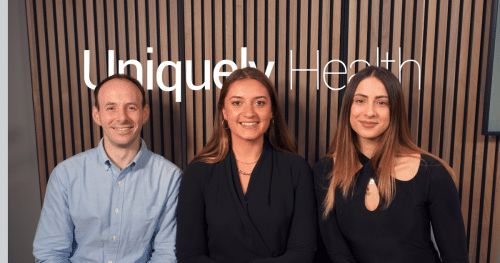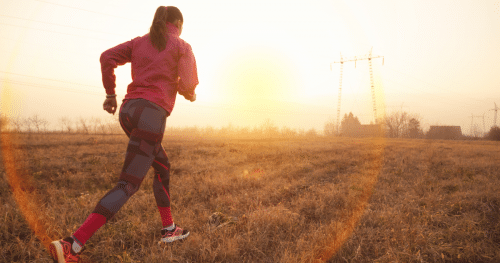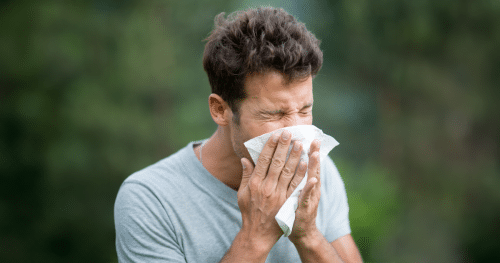Written by Soodeh Akhondan Bsc (Hons), Msc, Dietitian and verified by Dr Fong Hoa Pham, MBBS PhD DIC BSc DipBSLM MRCGP, GP & Clinical Lead
Feeling tired and sluggish? Is it worse over the winter months? Or maybe you spend most of your time indoors? If so, you may be deficient in the ‘sunshine’ vitamin! 1 in 6 adults and nearly 20% of children have low vitamin D levels (Department of Health and Social Care, 2022). Vitamin D is vital for strong bones, pain-free joints, a healthy immune system and even good mood. Keep reading to learn more and understand what our registered dietitian recommends to ensure you are getting enough.
What is Vitamin D?
Vitamin D is a fat-soluble steroidal hormone. It is synthesised in our skin cells by exposure to ultraviolet light. Some foods provide rich sources of vitamin D however sufficient levels cannot be attained only from diet. The main source of vitamin D synthesis is through exposure to sunlight.
80-90% of vitamin D is produced in the skin cells from exposure to the Sun light. Only 10-20% of vitamin D can be derived from diet (NICE, 2022)
Why do we need it?
Vitamin D is needed for healthy bones, healthy immune system and regulates cell growth and differentiation to protect against certain cancers.
Vitamin D plays a vital role regulating the body’s calcium and phosphate. It also plays a role in sleep regulation through triggering the production of melatonin (Romano et al. 2020). In addition, studies have shown vitamin D to play a key role in reducing cancer cell growth, infections, and inflammation (Fleet et al., 2012; Liu et al., 2018; Wang et al., 2017).
Deficiency can lead to: Rickets, Joint pain, osteoporosis, insomnia, low mood and depression, weight gain, fatigue, cramps and a higher risk of falls and fractures (Yao et al. 2019). Deficiency can put you at risk of developing type 2 diabetes, cardiovascular disease and colon cancer.
Sun exposure
Firstly, we must understand that not all sun exposure leads to vitamin D synthesis. There are two types of UV light, UV-A and UV-B. UV-A is associated with skin aging, UV-B is associated with skin burning. The skin cells use UV-B to synthesis vitamin D.
Vitamin D can be synthesised underwater and through scattered UV-B rays when in shade. UV-B CANNOT however penetrate glass, although UV-A rays CAN still reach your skin.
Suncream can block both UVA and UVB rays, so whilst sun exposure can support vitamin D synthesis, be aware of how much exposure you get to avoid negative effects. It is important to consider, if you have a personal or family history of skin cancer, ensure a high factor protection and consider more reliance on food and supplements for vitamin D repletion.
Risk factors of vitamin D deficiency
- Vitamin D synthesis is limited with less sunlight, which are controlled by season, time of day, latitude, air pollution levels, altitude, suncream use and time spend indoors (Lips, 2006).
- Over 65s are more at risk for deficiency as are people who are obese or have kidney or liver disease (Lips, 2006).
- People with darker skin tones are at higher risk of deficiency due to the extra melanin pigment in the skin which protects the skin from UV rays (Powe et al. 2013).
How can I get enough vitamin D?
Recommended sun exposure:
The National Institute of Health (NICE) recommends unprotected sun exposure of 5-30 minutes between 10am – 3pm two to three times a week.
Should I take vitamin D supplements?
NHS England recommends taking 10micrograms vitamin D supplement over the darker Autumn and Winter months due to the limited sun light exposure and daylight hours. People at higher risk of deficiency are recommended to take 10 micrograms vitamin D every day throughout the year.
There are 2 types of vitamin D supplements: Vitamin D2 (ergocalciferol) which is naturally made in plants; and Vitamin D3 (cholecalciferol) which is found in animal meats. There is some evidence that vitamin D3 supplements result in higher and more sustained vitamin D levels (Wilson et al. 2017). If you are following a vegan lifestyle, reminder to check all the ingredients, as some other components of capsules, such as gelatine, are animal derived.
Be careful! It is possible to take too much through supplements – over time this can cause a calcium build-up in the body, and in turn, weaken bones, and damage the kidneys and heart. NHS England recommends not exceeding 100 micrograms of vitamin D a day. It is not possible however to overdose through sun or food sources as the body regulates this.
You can optimise the absorption of supplements by:
- Taking supplements in the morning/early afternoon as taking them later in the day can disturb sleep (Han et al. 2017).
- Taking supplements alongside a low-fat snack or meal (Dawson-Hughes, 2013).
- Have a diet rich in vitamin K2 by including animal foods & fermented dishes (Capozzi et al. 2020).
- Have a Magnesium-rich diet or supplement with Magnesium (Reddy & Edwards, 2019). Foods rich in magnesium include nuts, seeds, wholegrains, dark leafy vegetables, milk, yoghurt, dried legumes and dried fruit.
How can I get vitamin D from my diet?
Although only 10-20% of vitamin D can be derived from diet, choosing vitamin D-rich foods can support your intake:
- Oily fish – salmon, mackerel, sardines, herring
- Red Meat
- Liver
- Egg Yolks
- Fortified foods (foods with added nutrients and vitamins)
- Mushrooms
Why you should consider checking your vitamin D levels
With the improvement of technology, it has become easier to stay indoors for many aspects: entertainment, food shopping, exercise and more. This not only affects our exposure to the outside world and sun but also impacts our dietary choices, mental health and holistic wellbeing.
Uniquely Health offers a complete blood testing service that can identify your vitamin D levels and provide tailored support to get your vitamin D levels sufficient as part of a holistic wellness check.
Key Conclusions
1. Vitamin D is vital for strong bones, pain-free joints, a healthy immune system and even good mood.
2. Vitamin D can synthesis in the body from exposure to sunlight, through diet or through supplements.
3. It is common to have vitamin D deficiency in darker months. .
If you are looking to check and improve your vitamin levels then book a complimentary call with our team to discuss how we can help you.
- Capozzi, A., Scambia, G., & Lello, S. (2020). Calcium, vitamin D, vitamin K2, and magnesium supplementation and skeletal health. Maturitas, 140, 55–63.
- Dawson-Hughes, B., Harris, S.S., Palermo, N.J., Ceglia, L. and Rasmussen, H. (2013). Meal conditions affect the absorption of supplemental vitamin D3 but not the plasma 25-hydroxyvitamin D response to supplementation. Journal of Bone and Mineral Research: The Official Journal of the American Society for Bone and Mineral Research, [online] 28(8), pp.1778–1783.
- Department of Health and Social Care (2022) New review launched into Vitamin D intake to help tackle disparities.
- Fleet JC, DeSmet M, Johnson R, Li Y. (2012). Vitamin D and cancer: a review of molecular mechanisms. Biochem J. ; 441(1):61-76.
- Han, B., Zhu, F.X., Shi, C., Wu, H.L. and Gu, X.H., 2017. Association between serum vitamin D levels and sleep disturbance in hemodialysis patients. Nutrients, 9(2), p.139.
- Lips, P., 2006. Vitamin D physiology. Progress in biophysics and molecular biology, 92(1), pp.4-8.
- National Institute for Health and Care Excellence [NICE] (2016) Sunlight Exposure: risks and benefits.
- National Institute for Health and Care Excellence [NICE] (revises 2022). Vitamin D Deficiency in Adults.
- Powe, C.E., Evans, M.K., Wenger, J., Zonderman, A.B., Berg, A.H., Nalls, M., Tamez, H., Zhang, D., Bhan, I., Karumanchi, S.A. and Powe, N.R., 2013. Vitamin D–binding protein and vitamin D status of black Americans and white Americans. New England Journal of Medicine, 369(21), pp.1991-2000.
- Reddy, P., & Edwards, L. R. (2019). Magnesium Supplementation in Vitamin D Deficiency. American journal of therapeutics, 26(1), e124–e132.
- Romano, F., Muscogiuri, G., Di Benedetto, E., Zhukouskaya, V. V., Barrea, L., Savastano, S., Colao, A., & Di Somma, C. (2020). Vitamin D and Sleep Regulation: Is there a Role for Vitamin D?. Current pharmaceutical design, 26(21), 2492–2496.
- Scientific Advisory Committee on Nutrition: Vitamin D and Health (2016).
- Wang, H., Chen, W., Li, D., Yin, X., Zhang, X., Olsen, N., & Zheng, S. G. (2017). Vitamin D and Chronic Diseases. Aging and disease, 8(3), 346–353.
- Wilson, L. R., Tripkovic, L., Hart, K. H., & Lanham-New, S. A. (2017). Vitamin D deficiency as a public health issue: using vitamin D2 or vitamin D3 in future fortification strategies. The Proceedings of the Nutrition Society, 76(3), 392–399.
- Yao, P., Bennett, D., Mafham, M., Lin, X., Chen, Z., Armitage, J., & Clarke, R. (2019). Vitamin D and Calcium for the Prevention of Fracture: A Systematic Review and Meta-analysis. JAMA network open, 2(12), e1917789.









